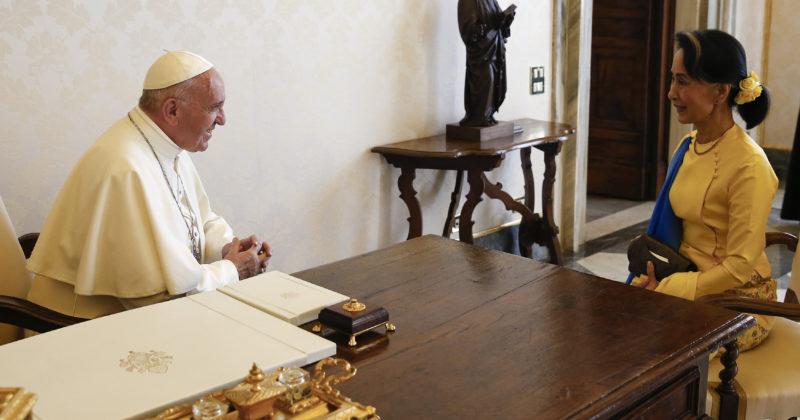Burma has a long way to go. But the Church will now be an even stronger voice for justice and peace
The meeting between Burma’s de facto leader Aung San Suu Kyi and Pope Francis, and the subsequent establishment of diplomatic relations between the Holy See and Burma, is a significant and very welcome step. It is only the latest in a recent series of historic moments for the Church in Burma in the past three years: the celebration of 500 years of the Church’s presence in the country, the beatification of Isidore Ngei Ko Lat ,Myanmar’s first Blessed, and the appointment of Burma’s first-ever Cardinal, Charles Maung Bo.
The establishment of formal diplomatic ties is also significant in the context of Burma’s fragile political transition. In November 2015 Aung San Suu Kyi and her party, the National League for Democracy, ended over five decades of military dictatorship when they overwhelmingly won the country’s first credible elections in a quarter of a century. Unlike the 1990 elections, which they also won, this time the result was respected and a year ago Burma’s first civilian-led, democrat-led government in over half a century took office.
Burma’s transition, however, is very far from complete. In this nascent democracy 200 political prisoners remain in jail, while the military continues to exert its power. The country’s constitution gives the military direct control over three key ministries – home affairs, border affairs and defence – and reserves a quarter of parliamentary seats for soldiers. Despite leading her party to electoral victory, the constitution prevents Aung San Suu Kyi from becoming President – so she serves as “State Counsellor” and foreign minister, while a close associate holds the office of President.
In Burma’s ethnic states, despite Aung San Suu Kyi’s talk of peace, the army – under the control of Chief of Staff Min Aung Hlaing – continues to oppress civilians and in some areas, particularly the predominantly Christian Kachin State and northern Shan State, it has intensified its offensives, resulting in the displacement of thousands. Rape, torture and extrajudicial killings continue. Humanitarian aid access to the conflict areas remains severely restricted, putting thousands of displaced people at risk of starvation.
Last December a Catholic church in northern Shan State was bombed and subsequently two Kachin Christian pastors, Nawng Latt and Gam Seng, were arrested after taking journalists to the bombed church to gather evidence. Even Lahpai Gam, a Kachin prisoner arrested by the Burma Army five years ago and jailed and whom the UN working group on arbitrary detention concludes is held arbitrarily and in violation of international law, remains in prison. He has been severely beaten from head to toe with an iron rod, forced to engage in sexual acts with another male prisoner, and forced to stand for hours with his arms outstretched as if being crucified. He has severe health problems as a result of the torture he endured, and human rights organisations are calling for his urgent release on medical grounds.
Furthermore, religious intolerance has risen in recent years, primarily a result of a Buddhist ultra-nationalist movement which has led a horrific campaign of hate speech and violence against Muslims and, albeit to a lesser extent, Christians. The Rohingyas are among the most persecuted people on earth and are enduring an appalling humanitarian crisis which has been condemned by the UN. The UN is investing potential crimes against humanity, war crimes and ethnic cleansing in Rakhine State.
Many would say, a year on, that little has changed in Burma except the faces in the government. Even the gains made in the final “reformist” years of the last military-led government – increased space for civil society, more freedom of expression, greater media freedom – are fragile.
Diplomatic relations between the Vatican and Burma should not, however, be mistaken for endorsement of the new government’s record. Diplomatic ties will, it is hoped, provide the Church with new, better and more formal channels through which to raise its voice of concern, and to encourage the government to protect human rights.
Pope Francis has spoken out several times for the Rohingya, recently calling them a “good and peaceful people who have suffered for years”. Cardinal Bo is a powerful, consistent and outspoken voice for human rights, justice, freedom and peace, weaving into almost every homily, regular public statements and articles messages defending human dignity for all the peoples of Burma. He describes the suffering of the Rohingyas as “an appalling scar on the conscience of my country”, and recently convened an interfaith peace conference of religious leaders to address the ethnic conflict in the rest of Burma.
Cardinal Bo describes the Church as a “rainbow Church”, one of the few institutions that truly represents the ethnic diversity of Burma. It has been one of the most courageous voices for justice and peace. Having diplomatic relations will, hopefully, enable the Church’s voice to be amplified with more impact in the corridors of power in Naypidaw.
